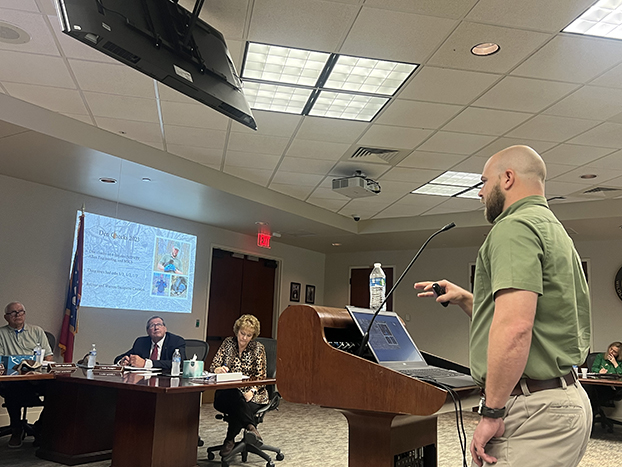Mississippi Commission hears State of the Bear report
Published 10:29 am Tuesday, November 21, 2023

- Anthony Ballard Jr., MDWFP's bear program coordinator, gives an update on the bear program work this past year at last week's commission meeting. (Hunter Cloud | The Daily Leader)
JACKSON — Anthony Ballard Jr presented a report on his first year in charge of the black bear program in Mississippi during last Thursday’s Mississippi Department of Wildlife, Fisheries and Parks commission meeting. The past year marked a significant milestone in the program’s history.
Ballard Jr. serves as the Mississippi Department of Wildlife, Fisheries and Parks Bear Program Director and immediately hit the ground running. One of his first tasks after taking charge of the bear program was carrying out den checks.
He said in the six den checks he did, three sows had cubs. One sow, mamma bear, had one cub, another had two cubs and the third sow had three cubs. The checks were done in Bolivar, Warren and Issaquena Counties. Ballard said he learned how to climb trees to do the den checks.
Trending
“The first time I used the climbing equipment was through training. The second time was in a sixty foot cypress tree and I found myself looking at a bear,” Ballard said. “You never know if you will be eye to eye with a bear or she could be all the way down the inside of the tree. It is always fun.”
MDWFP’s next project was to trap black bears around the state to do a tracking collar study. Ballard ditched the traditional trapping methods of day-old donuts and culvert traps to use his experience trapping wild hogs with livestream cameras. It worked as they collared 22 bears over the summer.
Ballard said 13 of those 22 bears were caught with the livestream camera and trap he had welded together. He likes to be able to control trapping bears because some situations could be dangerous such as extreme heat and cubs following their mom into the trap.
“It puts you over the situation with great control. I can monitor them without being on site,” Ballard said. “We started slamming doors like a teenager with a bad attitude. We didn’t have to manipulate anything. The bear just has to go in. We collared 22 bears in three counties.”
MDWFP’s collar research project in conjunction with Mississippi State University College of Forest Resources will seek to understand habitat selection and breeding success. The work has already been done in the delta but Ballard said they wanted to expand their work.
Most of Mississippi’s trapping was done in South Mississippi. All of the data collected from the bear collars will contribute to ongoing research at MSU.
Trending
Ballard said four bears are in Wilkinson County, One is in Claiborne and Jefferson Counties, one is in Copiah and Franklin Counties and one left Woodville, crossed the Mississippi River and went across the Atchafalaya basin into south Louisiana.
“He is currently chilling out near Lafayette nearly 70 miles from where he was collared. We have coordinated with Louisiana’s bear program. They have two Louisiana bears in Mississippi right now,” Ballard said. “We have the same partnership with Arkansas or Tennessee. One bear collared in Mississippi was legally harvested in Arkansas.”
Mississippi’s biggest question about the bear program right now is due to its neighbor Louisiana passing a Notice of Intent to create its first modern black bear season. Commissioner Leonard Bentz asked Ballard when Mississippi will have their first season.
“You have to know how many you have first. We could have one. It isn’t if but when we can have one,” Ballard said. “On what scale that season would be is dependent on data. A lot of puzzle pieces have to be put together first.”





